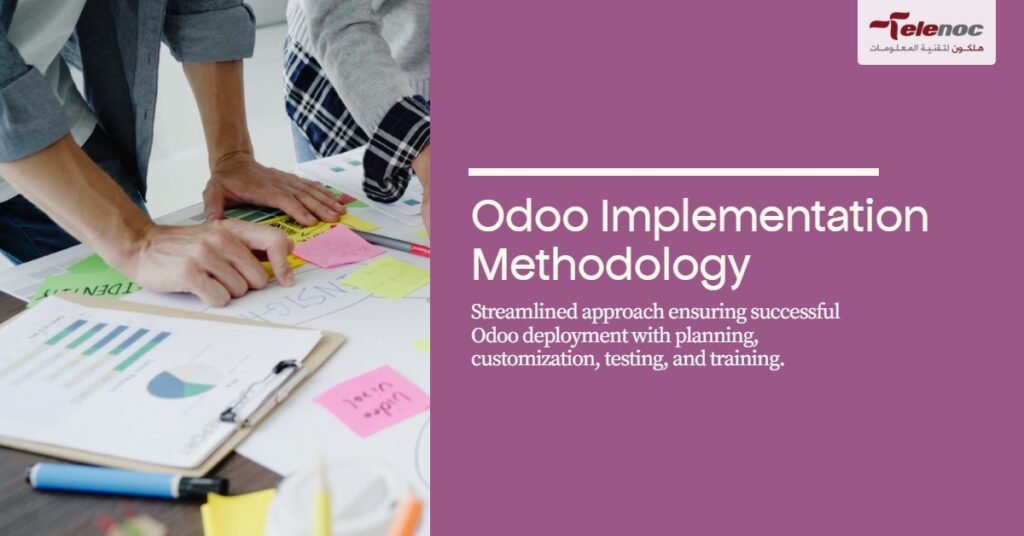Introduction
As an Odoo Gold Partner in Saudi Arabia, TeleNoc specializes in delivering end-to-end Odoo ERP implementation services tailored to your business needs. Our team ensures a smooth transition from legacy systems to Odoo, helping you optimize operations and enhance productivity. This is comprehensive guide on Odoo Implementation Methodology for ERP consultants.
Key Concepts of Odoo Implementation
1. Project Leadership
- The success of an Odoo project depends on the Project Leader, who ensures that the implementation stays on schedule and within budget.
- Customers define their business needs (what), while the Project Leader decides how to meet these needs using Odoo (how).
2. Keeping It Simple
- Limit unnecessary customizations to avoid project delays and additional costs.
- Minimize stakeholder involvement to speed up decision-making.
- Train key users early to ensure smooth adoption.
3. Project Success Metrics
- A project is considered successful if it is delivered on time and within budget.
- Customer satisfaction during implementation is secondary to ensuring a functional, well-integrated ERP system.
The Odoo Implementation Process: Step-by-Step
1. ROI Analysis (10% of project time)
- Assess the Return on Investment (ROI) by mapping business needs to Odoo features.
- Identify pain points in the current system and propose a proof of concept (PoC).
- Conduct workshops with key users to validate requirements.


2. Project Kick-Off (5% of project time)
- Align stakeholders with the methodology.
- Define a project plan and finalize the implementation strategy.
- Provide initial training to the Single Point of Contact (SPoC), who will act as the internal Odoo expert.
3. Implementation Phase (80% of project time)
- Configuration: Set up Odoo apps with minimal custom development.
- Data Migration: Import essential data while avoiding unnecessary historical records.
- Validation & User Training: Train end-users and ensure all processes are thoroughly tested.


4. Go-Live & Deployment (5% of project time)
- Configuration: Set up Odoo apps with minimal custom development.
- Data Migration: Import essential data while avoiding unnecessary historical records.
- Validation & User Training: Train end-users and ensure all processes are thoroughly tested.
Common Challenges in Odoo Implementation & Solutions
1. Resistance to Change
- Employees may resist adopting a new ERP system due to comfort with legacy processes.
- Solution: Educate users on Odoo’s benefits, involve them early, and provide hands-on training.
2. Managing Customer Expectations
- Clients may request unnecessary custom features, increasing project complexity.
- Solution: Focus on core business needs, minimize development, and explain the long-term costs of customizations.
3. Internal Politics & Decision-Making Delays
- Multiple decision-makers can slow down the implementation process.
- Solution: Work with a Single Point of Contact (SPoC) who has decision-making authority.
4. Data Migration Issues
- Clients often want to import years of historical data, increasing costs and potential errors.
- Solution: Import only essential master data and keep historical records in backup files.
Why Custom Development Should Be Minimized
- Custom development increases technical debt, leading to higher maintenance and upgrade costs.
- The complexity of a project grows exponentially with each customization.
- Best Practice: Stick to Odoo’s standard features as much as possible and implement custom solutions only when absolutely necessary.
Measuring Implementation Success
On-Time & On-Budget Delivery
The project meets its deadlines without exceeding financial constraints.
User Adoption & Efficiency Gains
Employees effectively use Odoo and experience productivity improvements.
Business Impact
The organization sees measurable benefits like cost savings
Conclusion
Implementing Odoo successfully requires a well-structured methodology that prioritizes efficiency, simplicity, and user adoption. By following these best practices and focusing on standard solutions, businesses can ensure a smooth transition to Odoo with minimal risks and maximum ROI.
Looking to implement Odoo for your business? Contact us today for expert guidance and seamless ERP deployment! Follow us on LinkedIn for new updates.


